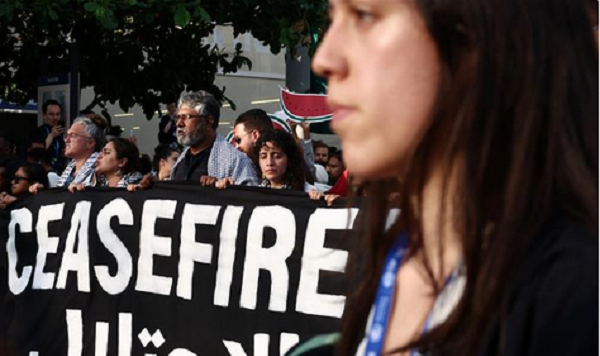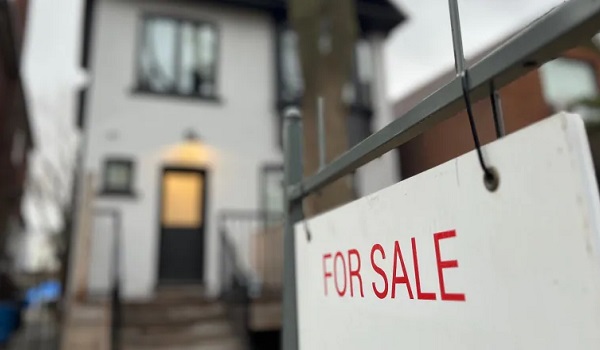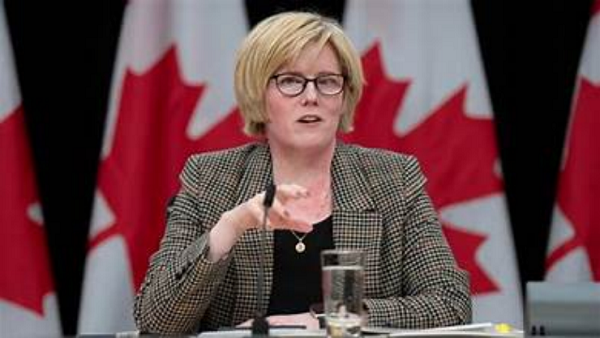COP28: Protests at UN climate talks, calls for a ceasefire in Gaza and ‘shocking level of censorship’
Activists designated Saturday a day of protest at the COP28 summit in Dubai. But the rules of the game in the tightly controlled United Arab Emirates meant sharp restrictions on what demonstrators could say, where they could walk and what their signs could portray.
A small group of demonstrators protesting the detention of activists — one from Egypt and two from the UAE — were not allowed to hold up signs bearing their names. A late afternoon demonstration of around 500 people, the largest seen at the climate conference, couldn’t go beyond the United Nations-governed Blue Zone in this autocratic nation. And their calls for a ceasefire in the Israel-Hamas war in the Gaza Strip couldn’t actually name the country involved.
“It is a shocking level of censorship in a space that had been guaranteed to have basic freedoms protected like freedom of expression, assembly and association,” Joey Shea, a researcher at Human Rights Watch focused on the Emirates, told The Associated Press after their restricted demonstration.
Pro-Palestinian protesters said they were told demonstrators could not say “from the river to the sea,” a slogan previously prohibited by the U.N. over the days of COP28.
In the aftermath of a brutal Hamas attack on Israel in October and subsequent bombing and ground offensive in the Gaza Strip, that phrase has been used by pro-Palestinian rallies to call for single state on the land between the Jordan River and the Mediterranean. Some Jews hear a clear demand for Israel’s destruction in the call.
Still, protestor Dylan Hamilton of Scotland said it remained important for demonstrators to cry out their grievances, even if they sounded like a cacophony of concerns ranging from climate change, the war or Indigenous rights.
“It’s essential to remind negotiators what they are negotiating about,” Hamilton said. “It’s trying to remind people to care about people you’ll never meet.”
Just before the demonstration about the activists, organized by Amnesty International and Human Rights Watch, protesters had to fold over signs bearing the names of the detainees — even after they already had crossed out messages about them. The order came roughly 10 minutes before the protest was due to start from the U.N., which said it could not guarantee the security of the demonstration, Shea said.
While speaking during the protest, Shea also had to avoid naming the Emirates and Egypt as part of the U.N.’s rules.
“The absurdity of what happened at this action today speaks volumes,” she said.
The Emirati government, in response to questions from the AP about the detainees protest, said it “does not comment on individual cases following judicial sentences.”
“In the spirit of inclusivity, peaceful assemblies in designated areas have been and continue to be welcomed,” the statement said. “We remain dedicated to fostering dialogue and understanding as we work together at COP28 to deliver impactful solutions for accelerating climate action.”
Demonstrators carried signs bearing the image of Emirati activist Ahmed Mansoor and Egyptian pro-democracy activist Alaa Abdel-Fattah.
Mansoor, the recipient of the prestigious Martin Ennals Award for Human Rights Defenders in 2015, repeatedly drew the ire of authorities in the United Arab Emirates, calling for a free press and democratic freedoms in this autocratic federation of seven sheikhdoms. He had been targeted with Israeli spyware on his iPhone in 2016 likely deployed by the Emirati government ahead of his 2017 arrest and sentencing to 10 years in prison over his activism.
Abdel-Fattah, who rose to prominence during the 2011 pro-democracy Arab Spring uprisings, became a central focus of demonstrators during last year’s COP27 in Sharm el-Sheikh, Egypt, as he had stopped eating and drinking water to protest his detention. He has spent most of the past decade in prison because of his criticism of Egypt’s rulers.
Since 2013, President Abdel-Fattah el-Sissi’s government has cracked down on dissidents and critics, jailing thousands, virtually banning protests and monitoring social media. El-Sissi has not released Abdel-Fattah despite him receiving British citizenship while imprisoned and interventions on his behalf from world leaders including U.S. President Joe Biden.
Demonstrators also held up the image of Mohamed al-Siddiq, another Emirati detained as part of the crackdown. Emiratis in white thobes walked or rode past the protest in carts, looking on in curiosity. The protests had been scheduled to take place days earlier, but negotiations with U.N. officials dragged on — likely due to the sensitivity of even mentioning the detainees’ names in the country.
Meanwhile Saturday, protesters briefly staged a sit-in at OPEC’s stand over a leaked letter reportedly calling on cartel member states to reject any attempt to include a phase-down of fossil fuels in any text at the summit.
“It’s like having, you know, a convention on fighting the tobacco industry and having the tobacco industry present in a negotiation. That is not okay,” campaigner Nicholas Haeringer said. “It’s like having a fox in the henhouse. And to be honest with you guys, I think at some point we will run out of analogies before these guys run out of oil.”
——
Associated Press journalist Peter Dejong contributed.
This article was reported by AP
















